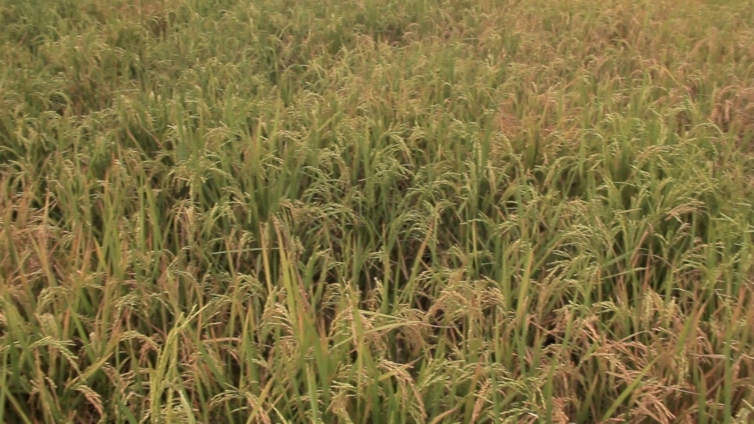A recent study led by researchers from the Indian Council of Agricultural Research (ICAR) reveals concerning insights about the nutritional content of rice and wheat in the Indian diet.
The study indicates that the focus on breeding high-yield varieties over the years has resulted in a decline in the nutritional value of these staple grains.
JoyNews correspondent Mahmud Mohammed-Nurudeen participated in a Down To Earth Magazine webinar titled "Drain Grain," which discussed the study's findings, emphasizing that these grains are not only losing nutritional value but also accumulating harmful toxins.
Over the last five decades, India has rapidly introduced high-yielding varieties of rice and wheat in its pursuit of food security.
The investigation has evaluated the health implications of this significant alteration in the nutrient profiles of rice and wheat. It cautions that the diminished nutritional value of these essential grains could exacerbate the increasing burden of non-communicable diseases (NCDs) in the country.
The panel of experts featured Sovan Debnath, a Soil Scientist from ICAR-Central Agroforestry Research Institute, Jhansi, and the study's primary author; Biswapati Mandal, former Professor at Directorate of Research, Bidhan Chandra Krishi Viswavidyalaya, Kalyani, and co-author of the study; Ishi Khosla, a Clinical Nutritionist, Consultant, and Writer; and Shagun, Senior Correspondent at Down To Earth.
In the initial phase of the Green Revolution in India, the primary goal was to address the challenges of a rapidly expanding population and achieve self-sufficiency in food production. Consequently, agricultural scientists concentrated on enhancing crop yields. However, as highlighted in the webinar,
Dr. Mandal explains that a significant shift occurred in breeding strategies after the 1980s. The new focus aimed at developing crop varieties resilient to pests, diseases, and various environmental stresses, including salinity, moisture, and drought.
"They did not have the luxury of thinking whether the plants were taking in nutrients from the soil or not. Hence, over a period of time, what we are seeing is that plants have lost their capacity to take up nutrients from the soil.”
The 2023 research builds upon a previous study conducted by scientists from ICAR and Bidhan Chandra Krishi Viswavidyalaya in 2021. This earlier study aimed to uncover the causes of zinc and iron deficiencies in populations relying on a cereal-based diet. The findings indicated a decline in the grain density of zinc and iron in high-yielding varieties of rice and wheat.
Debnath, a key contributor to both studies, notes that their experiments demonstrated the reduced efficiency of modern-bred rice and wheat cultivars in absorbing nutrients like zinc and iron, despite the soil's ample availability of these elements.
"Our experiments showed that modern-bred cultivars of rice and wheat are less efficient in sequestering nutrients like zinc and iron, despite their availability in soil.”
The 2021 research also highlighted that the surge in the global population experiencing zinc and iron deficiencies in the last four decades coincided with the worldwide dissemination of high-yielding, input-responsive cereal cultivars introduced in the post-Green Revolution era.
According to Down To Earth's coverage of the study, essential nutrient concentrations such as zinc and iron in rice have witnessed a reduction of 33% and 27%, respectively, over the past 50 years. In wheat, the corresponding decreases are 30% for zinc and 19% for iron. Additionally, the concentration of arsenic, a toxic element, in rice has surged by 1,493%.
The magazine report suggests that not only are staple food grains becoming less nutritious, but they are also posing health risks.
"Amid continuous genetic tampering under the modern breeding programme, the plants have also lost their natural evolutionary defence mechanisms against toxins,” it says.
A reduced concentration of vital nutrients in staple grains may lead to an increased incidence of diseases associated with neurological, reproductive, and musculoskeletal systems. Shagun from Down To Earth highlighted that the agricultural practices influenced by the Green Revolution have frequently faced criticism for their environmental and food system effects. However, discussions have seldom extended beyond their impact on issues such as soil degradation, surface water pollution, groundwater depletion, and mono-cropping.
"This study has put the spotlight on the impact of the Green Revolution on the nutritional security of India."
There are notable endeavors in the country to enhance the nutritional content of food grains. Agricultural scientists are exploring landraces and wild species of cultivated varieties to address this concern. As part of a dedicated bio-fortification project initiated by the Union government, scientists from ICAR and other agricultural universities are engaged in germplasm exploration to identify donor varieties with high nutritional content. Up to now, ICAR-affiliated institutes have produced 142 bio-fortified varieties. However, Shagun notes that these varieties are yet to gain widespread popularity and adoption among farmers.
Latest Stories
-
As theories swirl about Air India crash, key details remain unknown
1 minute -
How to register for 2025 Absa Black Star Marathon
19 minutes -
Ministry of Defence withdraws military protection for ineligible civilians
25 minutes -
Ethiopian troops ‘executed’ aid workers in Tigray war, charity says
36 minutes -
I’m ‘disappointed but not done’ with Putin, Trump tells BBC
38 minutes -
Today’s Front pages: Tuesday, July 15, 2025
1 hour -
Fitch affirms UBA Ghana’s Credit Rating at ‘B-’, citing strong profitability and capital buffers
3 hours -
‘SafeCare is Changing Lives’: Gradually redefining quality care in Ghana
3 hours -
NSA Director General graces Teqball National Club Championship, calls for corporate support
3 hours -
Novo Nordisk and American Society of Hematology announce new initiative to help improve sickle cell disease care in Africa
3 hours -
Telecel Ghana rewards 12th Dream Car Promo Winner with brand-new Hyundai Creta
3 hours -
No vigilante group can defy a determined police – CDD Ghana’s Dr Kojo Asante
3 hours -
Grow For Me: Transforming Agriculture through mobile investment
4 hours -
Musk’s Grok signs $200m deal with Pentagon days after antisemitism row
4 hours -
10 Chinese nationals denied bail in gold case
4 hours

